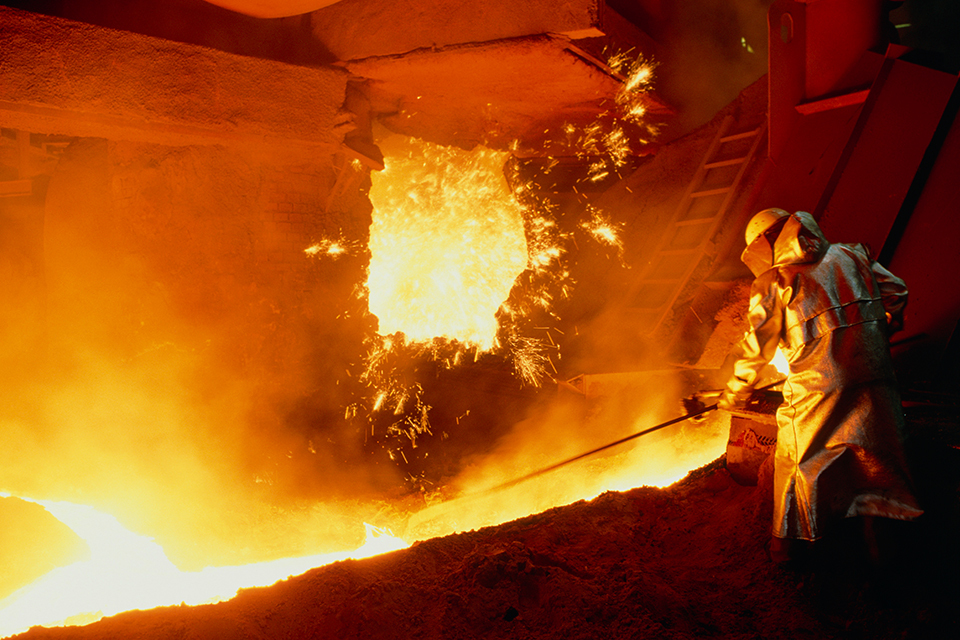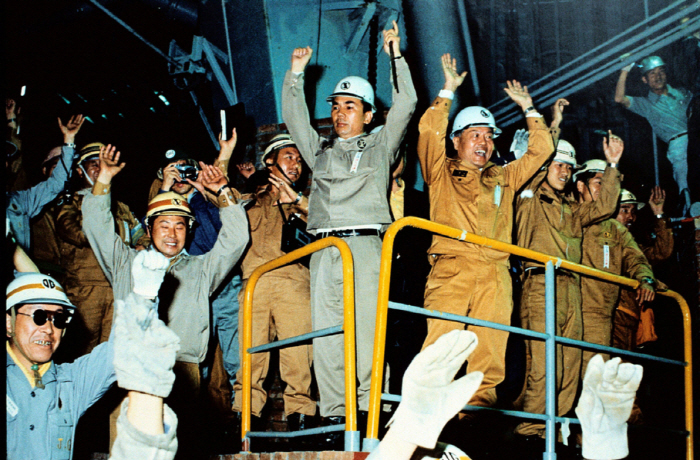Posco calls time on oldest blast furnace
Korea’s first furnace, touted as foundation of national growth, to turn into museum
By Kim Da-solPublished : Dec. 29, 2021 - 16:03

South Korea’s oldest furnace in Pohang, the home city for steelmaker Posco, has shut down operations on Wednesday, signaling an end to a decadeslong chapter of the nation’s manufacturing-driven industrial growth.
The company’s first blast furnace that had run since 1973 was renovated twice as the average lifespan of furnaces lasts around 15 years.
“Behind the country stepping up as the world’s top 10 economic power, there was Pohang No. 1 furnace and employees’ hard work,” said Posco President Kim Hag-dong.
The company’s first blast furnace that had run since 1973 was renovated twice as the average lifespan of furnaces lasts around 15 years.
“Behind the country stepping up as the world’s top 10 economic power, there was Pohang No. 1 furnace and employees’ hard work,” said Posco President Kim Hag-dong.

Established inside Korea’s first integrated mill, the facility in Pohang was built as the government at that time sought to make the nation an industrial superpower.
It had produced more than 55 million metric tons of crude steel until now, an equivalent to building 1,380 300,000-ton oil tankers or 55.2 million mid-sized vehicles.
The company said that the facility had supported the country’s manufacturing industry in various sectors such as shipbuilding, automotive and electronics to make a quantum leap over a short period of time.
Posco said considering the historical value of the No. 1 furnace, it will keep most of the furnace’s facilities as is and turn it into a museum for the public.
While the steelmaker has eight other furnaces including five in Gwangyang, South Jeolla Province, it has announced it would inject 30 trillion won ($25.3 billion) to develop an eco-friendly hydrogen reduction steelmaking process by 2040 to power furnaces entirely with hydrogen and become carbon emission-free.
Ironmaking typically generates a hefty amount of greenhouse gases in its coke-using iron ore reduction process. Such process emits nearly 2 tons of carbon dioxide per 1 ton of iron.
But when hydrogen gas is used in place of coke, the furnace emits water vapor only.
Earlier, Posco said it will also consider closing or renovating the No. 2 furnace in Pohang as early as 2025, to boost overall productivity by shutting older facilities or keep them up to date. The facility began working since 1976.
It had produced more than 55 million metric tons of crude steel until now, an equivalent to building 1,380 300,000-ton oil tankers or 55.2 million mid-sized vehicles.
The company said that the facility had supported the country’s manufacturing industry in various sectors such as shipbuilding, automotive and electronics to make a quantum leap over a short period of time.
Posco said considering the historical value of the No. 1 furnace, it will keep most of the furnace’s facilities as is and turn it into a museum for the public.
While the steelmaker has eight other furnaces including five in Gwangyang, South Jeolla Province, it has announced it would inject 30 trillion won ($25.3 billion) to develop an eco-friendly hydrogen reduction steelmaking process by 2040 to power furnaces entirely with hydrogen and become carbon emission-free.
Ironmaking typically generates a hefty amount of greenhouse gases in its coke-using iron ore reduction process. Such process emits nearly 2 tons of carbon dioxide per 1 ton of iron.
But when hydrogen gas is used in place of coke, the furnace emits water vapor only.
Earlier, Posco said it will also consider closing or renovating the No. 2 furnace in Pohang as early as 2025, to boost overall productivity by shutting older facilities or keep them up to date. The facility began working since 1976.








![[Graphic News] More Koreans say they plan long-distance trips this year](http://res.heraldm.com/phpwas/restmb_idxmake.php?idx=644&simg=/content/image/2024/04/17/20240417050828_0.gif&u=)
![[KH Explains] Hyundai's full hybrid edge to pay off amid slow transition to pure EVs](http://res.heraldm.com/phpwas/restmb_idxmake.php?idx=644&simg=/content/image/2024/04/18/20240418050645_0.jpg&u=20240419100350)






![[From the Scene] Monks, Buddhists hail return of remains of Buddhas](http://res.heraldm.com/phpwas/restmb_idxmake.php?idx=652&simg=/content/image/2024/04/19/20240419050617_0.jpg&u=20240419175937)

![[KH Explains] Hyundai's full hybrid edge to pay off amid slow transition to pure EVs](http://res.heraldm.com/phpwas/restmb_idxmake.php?idx=652&simg=/content/image/2024/04/18/20240418050645_0.jpg&u=20240419100350)

![[Today’s K-pop] Illit drops debut single remix](http://res.heraldm.com/phpwas/restmb_idxmake.php?idx=642&simg=/content/image/2024/04/19/20240419050612_0.jpg&u=)